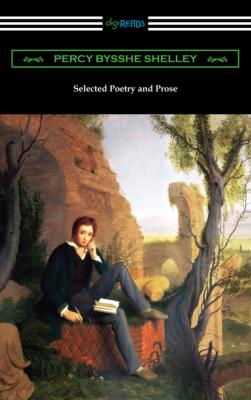Selected Poetry and Prose. Percy Bysshe Shelley
Читать онлайн.| Название | Selected Poetry and Prose |
|---|---|
| Автор произведения | Percy Bysshe Shelley |
| Жанр | Зарубежные стихи |
| Серия | |
| Издательство | Зарубежные стихи |
| Год выпуска | 0 |
| isbn | 9781420972061 |
Girt round with weakness;—it can scarce uplift
The weight of the superincumbent hour;
It is a dying lamp, a falling shower,
A breaking billow;—even whilst we speak
Is it not broken? On the withering flower
The killing sun smiles brightly: on a cheek
The life can burn in blood, even while the heart may break.
XXXIII
His head was bound with pansies overblown,
And faded violets, white, and pied, and blue;
And a light spear topped with a cypress cone,
Round whose rude shaft dark ivy-tresses grew
Yet dripping with the forest’s noonday dew,
Vibrated, as the ever-beating heart
Shook the weak hand that grasped it; of that crew
He came the last, neglected and apart;
A herd-abandoned deer struck by the hunter’s dart.
XXXIV
All stood aloof, and at his partial moan
Smiled through their tears; well knew that gentle band
Who in another’s fate now wept his own,
As in the accents of an unknown land
He sung new sorrow; sad Urania scanned
The Stranger’s mien, and murmured: ‘Who art thou?’
He answered not, but with a sudden hand
Made bare his branded and ensanguined brow,
Which was like Cain’s or Christ’s—oh! that it should be so!
XXXV
What softer voice is hushed over the dead?
Athwart what brow is that dark mantle thrown?
What form leans sadly o’er the white death-bed,
In mockery of monumental stone,
The heavy heart heaving without a moan?
If it be He, who, gentlest of the wise,
Taught, soothed, loved, honoured the departed one,
Let me not vex, with inharmonious sighs,
The silence of that heart’s accepted sacrifice.
XXXVI
Our Adonais has drunk poison—oh!
What deaf and viperous murderer could crown
Life’s early cup with such a draught of woe?
The nameless worm would now itself disown:
It felt, yet could escape, the magic tone
Whose prelude held all envy, hate and wrong,
But what was howling in one breast alone,
Silent with expectation of the song,
Whose master’s hand is cold, whose silver lyre unstrung.
XXXVII
Live thou, whose infamy is not thy fame!
Live! fear no heavier chastisement from me,
Thou noteless blot on a remembered name!
But be thyself, and know thyself to be!
And ever at thy season be thou free
To spill the venom when thy fangs o’erflow;
Remorse and Self-contempt shall cling to thee;
Hot Shame shall burn upon thy secret brow,
And like a beaten hound tremble thou shalt—as now.
XXXVIII
Nor let us weep that our delight is fled
Far from these carrion kites that scream below;
He wakes or sleeps with the enduring dead;
Thou canst not soar where he is sitting now—
Dust to the dust! but the pure spirit shall flow
Back to the burning fountain whence it came,
A portion of the Eternal, which must glow
Through time and change, unquenchably the same,
Whilst thy cold embers choke the sordid hearth of shame.
XXXIX
Peace, peace! he is not dead, he doth not sleep—
He hath awakened from the dream of life—
’Tis we, who lost in stormy visions, keep
With phantoms an unprofitable strife,
And in mad trance, strike with our spirit’s knife
Invulnerable nothings.—We decay
Like corpses in a charnel; fear and grief
Convulse us and consume us day by day,
And cold hopes swarm like worms within our living clay.
XL
He has outsoared the shadow of our night;
Envy and calumny and hate and pain,
And that unrest which men miscall delight,
Can touch him not and torture not again;
From the contagion of the world’s slow stain
He is secure, and now can never mourn
A heart grown cold, a head grown gray in vain;
Nor, when the spirit’s self has ceased to burn,
With sparkless ashes load an unlamented urn.
XLI
He lives, he wakes—’tis Death is dead, not he;
Mourn not for Adonais.—Thou young Dawn,
Turn all thy dew to splendour, for from thee
The spirit thou lamentest is not gone;
Ye caverns and ye forests, cease to moan!
Cease, ye faint flowers and fountains, and thou Air,
Which like a mourning veil thy scarf hadst thrown
O’er the abandoned Earth, now leave it bare
Even to the joyous stars which smile on its despair!
XLII
He is made one with Nature: there is heard
His voice in all her music, from the moan
Of thunder, to the song of night’s sweet bird;
He is a presence to be felt and known
In darkness and in light, from herb and stone,
Spreading itself where’er that Power may move
Which has withdrawn his being to its own;
Which wields the world with never-wearied love,
Sustains it from beneath, and kindles it above.
XLIII
He is a portion of the loveliness
Which once he made more lovely: he doth bear
His
